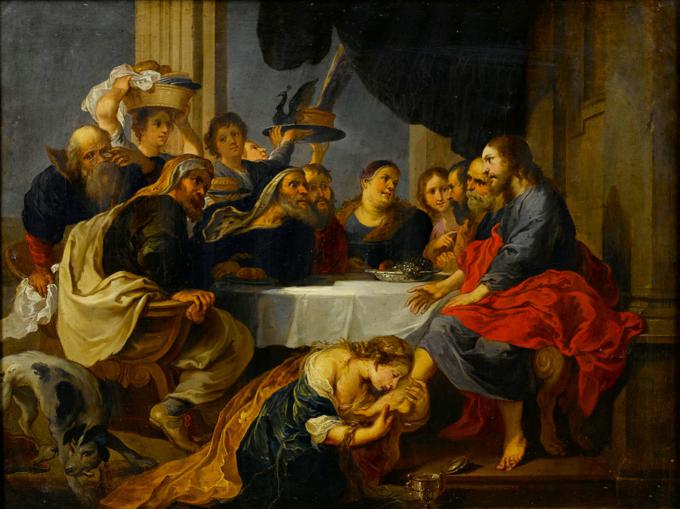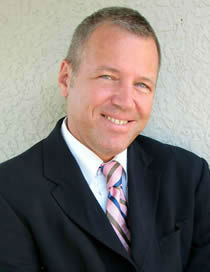
Spirituality
... like Mary anointing the feet of Jesus and wiping them with her hair, it can help, for the person who committed the original injury, to foster a holy sorrow -- not a morbid guilt, but an apt "purification of memory."

Pakaluk
Many of us remember that at the turn of the Millennium St. Pope John Paul II confessed sins and requested pardon on behalf of Christians for past anti-Semitism. This took place in a remarkable ceremony during a solemn Mass in St. Peter's Square of March 12, 2000, marking a "Day of Pardon." But do we remember that on the same occasion he sought pardon for sins of racism? It seems like a good time to ponder the event.
In the ceremony, a cardinal from the Curia would read a petition; there was a moment of silence; the Holy Father would answer with another prayer; and then everyone chanted the Kyrie Eleison, the Holy Father embracing and kissing a crucifix.
The very first petition gave the rationale for the ceremony: "Let us pray that our confession and repentance will be inspired by the Holy Spirit, that our sorrow will be conscious and deep, and that, humbly viewing the sins of the past in an authentic 'purification of memory,' we will be committed to the path of true conversion."
At the time, the ceremony was controversial. Why should the pope, or Christians alive at that time, confess sins from the past, even the distant past, which they themselves did not commit? Also, wasn't it the teaching of the Church that the Church itself is holy? But how could a holy Church confess sins?
But John Paul II was adamant about the need for the "purification of memory," an important phrase for him. He would cite John 8:7 in support, "Let him who is without sin among you be the first to throw a stone at her." With these words, he would explain, Jesus wanted the crowd to reflect that they were all implicated in the sin of the woman whom they wished to condemn -- even though perhaps they strongly opposed adultery all their lives and never committed adultery.
Once he said to the bishops of East Timor during their pastoral visit, referring to the horrible Dili Massacre, "The memory of that appalling tragedy will not fail to raise the question: How could such cruel and irrational violence have been unleashed? If one excludes those who gave their own lives in forgiveness, will anyone be able to consider himself fully immune from the contagion of that homicidal violence?"
That is: if you gave up your own life in witness to the injustice, you were exempted, but otherwise you needed to examine yourself for complicity or analogous injustice. Such a rule applies to all the living without exception.
At the Day of Pardon ceremony, the head of the Congregation for the Doctrine of the Faith, the successor to the Roman Inquisition, offered the prayer of confession for "sins committed in the service of truth." "May each of us recognize," Cardinal Ratzinger prayed, "that even men of the Church, in the name of faith and morals, have sometimes used methods not in keeping with the Gospel in the solemn duty of defending the truth."
One supposes that if Cardinal Ratzinger could pray that prayer, then all of us could share in the prayer of Archbishop Hamao which followed, that Christians be given the grace to repent "of the words and attitudes caused by pride, by hatred, by the desire to dominate others," to which the Holy Father answered:
"Lord God, our Father, you created the human being, man and woman, in your image and likeness, and you willed the diversity of peoples within the unity of the human family. At times, however, the equality of your sons and daughters has not been acknowledged, and Christians have been guilty of attitudes of rejection and exclusion, consenting to acts of discrimination on the basis of racial and ethnic difference. Forgive us and grant us the grace to heal the wounds still present in your community on account of sin, so that we will all feel ourselves to be your sons and daughters."
Historical truthfulness requires us to observe that, for the purposes of this ceremony, John Paul II grouped together, as similar, offenses against the equal and complementary dignity of women, and offenses based on racism. Did he do so as a mere expedient, to save time? Or did he discern a deep connection between the two -- between denying the complementarity of man and woman, and not being able to see clearly through to our shared humanity, which is the basis for solidarity in the human community? If the latter, then today the Catholic Church is just about the sole institution that can offer effective salve for our country's wounds.
Perhaps in your personal life you know someone who injured another, sought forgiveness, and found reconciliation. In such cases, from the point of view of the person who forgives, it can make sense to say "forgive and forget." The past is past; it is water under the bridge. But like Mary anointing the feet of Jesus and wiping them with her hair, it can help, for the person who committed the original injury, to foster a holy sorrow -- not a morbid guilt, but an apt "purification of memory."
"Come, let's away to prison," King Lear says to Cordelia, "We two alone will sing like birds i' th' cage. /When thou dost ask me blessing, I'll kneel down/ And ask of thee forgiveness."
But how much the more does the rule apply if there has not been full reconciliation?
- Michael Pakaluk is Professor of Ethics and Social Philosophy in the Busch School of Business at The Catholic University of America. His book on the gospel of Mark, "The Memoirs of St. Peter," is available from Regnery Gateway.
Recent articles in the Spirituality section
-
He saw the cloths and believedBishop Robert Barron
-
God's instrument for viewing the crucifixionMichael Pakaluk
-
QuinquagesimaMichael Pakaluk
-
Pro-life Christians: Now is the time to shout from the rooftopsBishop Robert Barron
-
Seeking an indulgence as an act of faithMichael Pakaluk


















